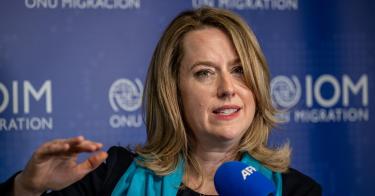When President Biden began his term, he announced, “America is back. Diplomacy is back at the center of our foreign policy… we will repair our alliances and engage with the world once again.” So why is his administration needlessly antagonizing its European allies in an effort to shoo an American bureaucrat into a critical United Nations slot?
Readers can be forgiven for knowing little about the International Organization for Migration. Outside of the international humanitarian world, few are familiar with it. In that world, however, the IOM is a big deal. And somehow, inexplicably, Team Biden has decided to launch a full-court press, replete with demarches and a lobbying tour to secure the IOM Director General slot for Amy Pope instead of Portuguese incumbent Antonio Vitorino.
The U.S. was instrumental in creating the IOM, which was established in 1951 to assist with the resettlement of refugees from World War II. The IOM was originally known as the Intergovernmental Committee for European Migration before being renamed in 1989.
In the decades since, the IOM has expanded to address migration crises around the world, and in 2016 the organization became part of the U.N. system. With 175 member states, over 17,000 staff, and revenues and expenditures topping $2.5 billion in 2021, the IOM is no small venture. In 2021, the organization operated in over 100 countries and assisted nearly 32 million internally displaced persons, migrants, and refugees.
>>> Joe Biden Must Thwart Chinese Plans To Lead the International Maritime Organization
Historically, the U.S. has been the largest contributor to the organization, with $682 million in assessed and voluntary contributions or 27 percent of total revenue in 2021.
The level of U.S. support, as is the case with a few other U.N. organizations like the World Food Program and UNICEF, has generally resulted in the U.S. candidate becoming Director General. A U.S. national has led the IOM for its entire history with only two exceptions.
Which brings us to the current confrontation.
One of those two exceptions, current Director General Antonio Vitorino of Portugal, was elected in 2018 when Ken Isaacs, the candidate nominated by President Trump, had trouble generating support. But the United States lost the seat fair and square, and from a big-picture perspective, having a national from a like-minded European country lead the IOM is a good consolation prize. The U.S. cannot expect to lead every important international organization, and must rely on allies to pursue a shared mission.
Biden’s “America is back” mantra implied a desire to burden share diplomatic missions and work cooperatively on shared global priorities. And for the United States, in addition to the imperative of effective and accountable leadership inside the United Nations and its specialized agencies (ahem, World Health Organization), those priorities include keeping multinational agencies out of the hands of the Russians and the Chinese, who can do serious harm (ahem, World Health Organization).
In the case of the IOM, however, the Biden administration apparently disagrees.
In the U.N. system, heads of organizations typically are reelected to a second term absent scandal, mismanagement, or malfeasance—and sometimes not even then (ahem, World Health Organization). While not everyone seems happy with Vitorino, there aren’t reports of serious mismanagement or corruption and he seemed assured of reelection… until the U.S. nominated IOM Deputy Director General Pope last Oct. 3.
The nomination preceded Vitorino’s own announcement for reelection. If the goal was to dissuade him from running, it failed. Vitorino launched his bid for reelection on Nov. 22 and European governments have rallied behind him. It did succeed, however, in fomenting considerable resentment and hostility among our European allies.
It may be tempting to ask: Who cares? But we should.
It has become clear that authoritarian regimes, like those in Russia and China, are seeking to influence international organizations and the international system to their benefit… and America’s detriment. One of the primary means for accomplishing this goal is for those governments to secure leadership positions in United Nations organizations. For this reason, both the Trump administration and Biden administration engaged in extended campaigns to prevent China and Russia from leading, respectively, the World Intellectual Property Organization and the International Telecommunication Union.
>>> China’s Global Influence Game
Winning these contests is hard, generally requiring support from most other nations. Often the starting point for rallying support starts with allies in Europe who share our fidelity to rules and norms established by the United States and its allies after World War II. Indeed, as illustrated when China won the leadership position of the Food and Agriculture Organization in 2019, prospects for victory diminish significantly when the U.S. and Europe support different candidates.
To give one timely example, this summer, a Chinese national is among the seven candidates running for Secretary General of the International Maritime Organization. Although not well known, significant matters relating to maritime policy will be decided by the IMO in upcoming years.
The U.S. and Europe should be cooperating to ensure that China does not secure this position. Instead, the past few months have seen the U.S. and European governments spending valuable diplomatic capital lobbying governments around the world on the IOM race.
The Biden administration prides itself on being diplomatically adept, but the IOM contest is another example of how short-sighted and maladroit it too often has been around the world.
Regardless of whether Pope wins or loses the May 15 election for IOM Director General, the U.S. has needlessly stirred up acrimony with Europe at exactly the time when we need to work together to support the best candidates win elections to lead U.N. organizations, and so much more.
This piece originally appeared in RealClear World




